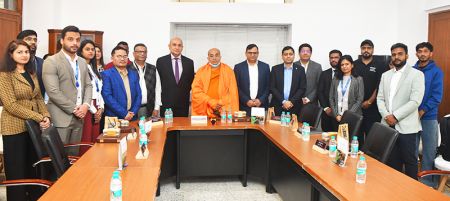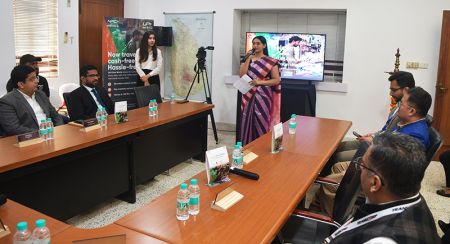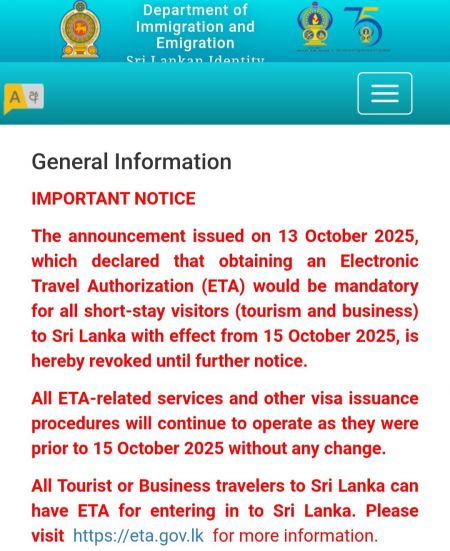|
Monday, 17 November 2025 20:50 |
|


The Sri Lanka High Commission in India, in partnership with the National Payments Corporation of India (NPCI), today launched a pilot initiative introducing UPI One World for Sri Lankan Buddhist pilgrims visiting India. This pioneering digital payment facility enables Sri Lankan travellers to make secure, real-time payments across India without the requirement of an Indian mobile number, offering a modern, convenient alternative to carrying cash.
|
|
Read more...
|
|
|
Thursday, 13 November 2025 15:25 |
|

The Ceylon Chamber of Commerce and the Gujarat Chamber of Commerce & Industry (GCCI) today signed a Memorandum of Understanding in Ahmedabad, Gujarat, to strengthen bilateral trade, investment, and business cooperation between Sri Lanka and Gujarat.
The MoU was signed by Mr. Krishan Balendra, Chairperson of The Ceylon Chamber of Commerce, and Mr. Sandeep R. Engineer, President of the Gujarat Chamber of Commerce & Industry.

The signing took place during the visit of Sri Lanka’s High Commissioner to India, Mahishini Colonne, marking her first official state-level engagement since assuming office.
The initiative and arrangements leading to the signing were facilitated by Sri Lanka’s Honorary Consul in Gujarat, Mr. Rakesh Shah, whose efforts played a key role in bringing the two chambers together.
|
|
Read more...
|
|
Tuesday, 11 November 2025 18:36 |
|

Deepening bilateral cooperation between Sri Lanka and Latvia in the field of consular and legal affairs, the Agreement on the Transfer of Sentenced Persons between the two countries was signed on 11 November 2025 at the High Commission of Sri Lanka in New Delhi.
The Agreement was signed on behalf of the Government of Latvia by Juris Bone, Ambassador of Latvia to India who is also concurrently accredited to Sri Lanka, and on behalf of the Government of Sri Lanka by Mahishini Colonne, High Commissioner of Sri Lanka to India.

The Agreement facilitates the transfer of sentenced persons between Sri Lanka and Latvia in accordance with each other’s national laws and regulations enabling individuals to serve their imposed sentences in their home countries. Guided by the principles of humanity and respect for human rights, the Agreement represents an important bilateral instrument promoting mutual legal collaboration and the social rehabilitation of sentenced persons while upholding humanitarian considerations.

The Ministry of Justice and National Integration of Sri Lanka will serve as the central authority for implementing the Agreement in Sri Lanka, while the Ministry of Justice of Latvia will act as the corresponding authority in Latvia.
The Embassy of Latvia in New Delhi is among the diplomatic missions of 99 countries concurrently accredited to Sri Lanka with residence in New Delhi. New Delhi hosts the highest number of accredited diplomatic missions for Sri Lanka of any foreign capital. The High Commission of Sri Lanka in New Delhi plays an important role in coordinating and facilitating engagement between Sri Lanka and these 99 accredited diplomatic missions.
11 November 2025
High Commission of Sri Lanka
New Delhi |
|
Tuesday, 11 November 2025 17:58 |
|

Sri Lanka’s High Commissioner to India, Mahishini Colonne, attended the inauguration of the SBI 1st Women’s T20 World Cup Cricket for the Blind 2025.
Speaking at the event, she highlighted the courage, inclusion, and power of the human spirit embodied by the participating women, and expressed pride in Sri Lanka co-hosting this historic tournament with India.
The event also featured the unveiling of the trophy - a powerful symbol of resilience, equality, and empowerment through sport.


|
|
Read more...
|
|
Wednesday, 29 October 2025 00:00 |
|
The announcement issued on 13 October 2025, which declared that obtaining an Electronic Travel Authorization (ETA) would be mandatory for all short-stay visitors (tourism and business) to Sri Lanka with effect from 15 October 2025, is hereby revoked until further notice.
All ETA-related services and other visa issuance procedures will continue to operate as they were prior to 15 October 2025 without any change.
All Tourist or Business travelers to Sri Lanka can have ETA for entering in to Sri Lanka. Please visit https://eta.gov.lk for more information.

|
|
|
|
|
|
|
Page 3 of 144 |